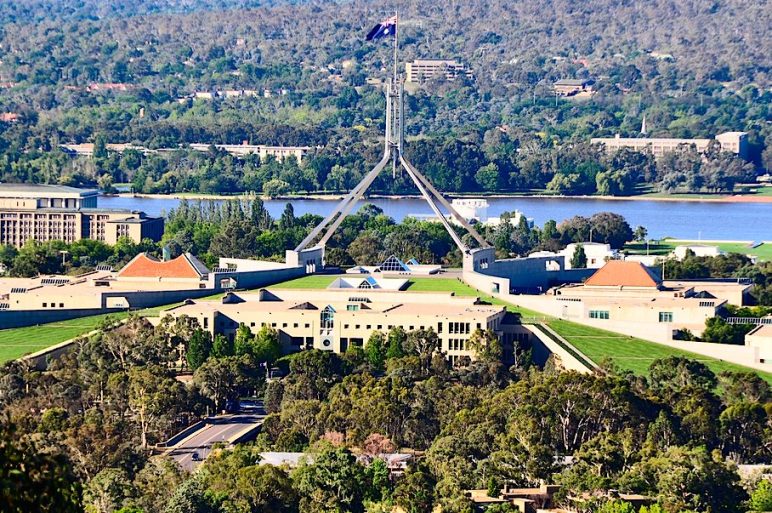The federal government revealed some of its budget plans this week with prime minister Scott Morrison and treasurer Josh Frydenberg announcing a $1.2 billion Digital Economy Strategy.
The headline figure is not as impressive as it initially sounds, with that figure spread out over six years rather than the usual budget stretch of four. And more than $500 million that figure is for upgrading the government’s own digital assets, most notably getting myGov and MyHealth Record up to speed.
But there are several initiatives to support the tech and startup sector, with the interactive gaming industry scoring a 30% Digital Games Tax Offset and changes to the way businesses can claim depreciation of intangible assets such as intellectual property and in-house software.
There’s $124.1 million to build the nation’s AI capabilities, including a National Artificial Intelligence Centre led by the CSIRO’s Data 61; and $35.7 million for aviation technologies such as drones, with grants prioritised to support regional Australia.
A further $111.3 million is earmarked towards the rollout of the Consumer Data Right in banking, energy and telecommunications.
So what does Australia’s tech and startup sector think of the annoucement? Here’s what they said:
Ron Curry
CEO, Interactive Games & Entertainment Association (IGEA)
We congratulate the Prime Minister, Minister Hume, the Minister for the Arts the Hon Paul Fletcher MP and the Treasurer Josh Frydenberg MP for recognising not only that video games have an important place alongside TV and film in Australian screen production and storytelling, but also their unparalleled potential for supercharging Australia’s exports, attracting vast inward investment, and up-skilling a whole new generation of Australian digital workers.
The Government’s new investment commitment today will do many things. It will spur the creation of brand new Australian game development studios, give existing Australian studios the support they need to take on ambitious new projects and accelerate their growth, plus attract further blockbuster AAA studios to Australia, all of which will create game development jobs in every state.
This new federal investment will underpin a new wave of Australian video game development, leading to even more amazing Australian-made games to take to the almost $250 billion global video games market – which is arguably the largest entertainment market in the world – and bring new Australian voices and stories to a truly global audience.
Roger Clarke
MD, Koch Media
It is clear from this decision that the Morrison Government has noticed how innovative and successful Australia’s game developers are, as evidenced by standout titles like Big Ant Studio’s AO Tennis 2 and SMG Studio’s Moving Out, to the amazing local independent studios like Mighty Kingdom and Hipster Whale who are exporting their games and services around the world, as well as the investment being poured into the Australian economy by international studios such as Sledgehammer Games, Gameloft, Wargaming, and Firemonkeys.
I thank the Morrison Government for engaging with and listening to IGEA, who have been relentlessly advocating for government funding for Australian video game development for years, and the talented Australian video games industry that it represents. With this new support, there is an incredibly bright future for Australian game developers and the wonderful games and experiences they create.
Rebecca Schot-Guppy
CEO, FinTech Australia

Rebecca Schot-Guppy.
The announcement from the Morrison government is welcome news for the entire technology and startup ecosystem as it signifies a shift in thinking in how technology buoys our economy.The fintech sector will especially welcome the ability to depreciate software, patents, designs, copyrights more quickly. It’s a starting point for a broader change in allowing and creating a separate pool of funds for software innovation with the research and development tax incentive.
The $124m to establish a national artificial intelligence centre led by the CSIRO will go towards helping all startups innovate. AI’s role in future fintech innovations cannot be understated.
We’re also pleased to see the government drive ahead with its plans to create a single digital ID for Australians that can be used across multiple services. We look forward to working closely with legislators on this, as the fintech industry will be instrumental in its implementation.
Finally, the additional $111 million to help speed up the rollout of the consumer data right is also welcome. We hope this will go toward enacting the recommendations in last month’s Senate Committee paper, which includes introducing intermediaries into the system to expedite rollout and uptake of the CDR.
These measures along with others mentioned in next week’s budget will form the crux of our discussions at Intersekt the following week.
Alex McCauley
CEO, StartupAUS

Alex McCauley
It’s great to see a recognition in the Budget that digital underpins the success of the economy as a whole. It’s clear that technology is going to play a major part in Australia’s economic recovery from Covid across a whole range of sectors.
Recognising that, as this Digital Economy Strategy does, and continuing to build on it will be critical in helping businesses right across the economy bounce back.
Ron Gauci
CEO, AIIA
We’ve been advocating for significant investment in health, skills, cybersecurity, digital payments and AI. The investment of $124.1 million for AI shows the Federal Government’s continued commitment to ensuring Australia becomes a leading digital economy.
However, in April we demonstrated that to fully fund a National AI Strategy, $250 million was needed. While investment in R&D is important, more needs to be done to ensure that there is significant investment in the commercialisation of AI here in Australia to deliver jobs and economic growth. Without it we will continue to fall behind the rest of the world.
We have a once-in-a-lifetime opportunity to reshape the technology at the core of the Australian health system. Now is the time to create lasting structural change as a result of setting up a strong and efficient national ICT health backbone and the investment of $500 million will go some way to bringing this to reality.
The AIIA remains committed to working with the Federal Government in its COVID-19 vaccination roll out delivering integration across platforms.
The AIIA recognises the Federal Government’s $100 million allocation towards the development of digital skills in the workforce, including the creation of cadetships.
Chris Ridd
Tech investor

Chris Ridd
I applaud any moves by the government to further the cause of the digital economy and to support the software startup industry. In particular, substantial investments to digital skills and further AI and Consumer Data Rights adoption are important initiatives for the software industry broadly.
Susie Jones
CEO and co-founder, Cynch Security

Cynch Security founder Susie Jones
Any business still operating after the last 12 months has come to terms with the need to be digital. Zoom, cashless payments, QR codes and even single touch payroll were all future problems last year. Not anymore.The $1.2b digital strategy announcement by the federal government has largely ignored cybersecurity which is disappointing to see. Continuing to push our economy forward into our new digital normal is both necessary and appropriate, but doing so without a consideration for the new risks technology introduces to small businesses is dangerous.
Cyber criminals and nation state actors already see the Australian small business ecosystem as a soft target, increasing their dependence on technology without incentivising businesses to tackle their cyber risk, will make things worse.
While awareness raising initiatives like the Cyber Security Business Connect and Protect grant provide some much needed beginnings, they benefit a fraction of the ecosystem and will leave the majority of small businesses fending for themselves. More awareness is great, but what small businesses are actually asking for is help figuring out what will work for them and how to go about implementing the right solutions.
While $6.9 million to support the likes of the caravan and camping industry will be appreciated by those that benefit, we strongly encourage the government to consider investing more than 0.01% of their budget towards this rapidly growing problem impacting 97% of Australian businesses.
Australian Cyber Security Centre has warned of a “significant increase” in attacks on businesses since March 2020, estimated to cost $29 billion to Australian businesses. We hope this is the last government announcement regarding our nation’s digital direction that is missing any meaningful support for ensuring businesses of all sizes have the ability to digitise in a safe and secure way.
John de la Motte
Co-founder, Compass

John de la Motte, Compass
Photo: Josh Robenstone
The fight for technology talent is much more competitive than pre-Covid. At Compass, we’re seeing a steep increase in base salaries, more jobs on the market and more technology companies with funding looking to hire.
The Federal Government’s initiative to invest more than $100 million in boosting digital skills is a win for the nation’s tech sector, especially as it includes a pilot of on-the-job work-based digital cadetships.
Looking at future hires, we’re deepening our relationships with universities to hire more graduates and are in the early stages of exploring opportunities to work with schools to demonstrate the opportunities to work in the tech sector.
We want to encourage more students to think about a career in engineering and technology.
Gautam Saghal
CEO, Perkbox
Investing in software is always a risk, especially if you are building a bespoke in-house product.
It’s generally expensive, where you start isn’t always where you end up, and the time needed to create new technology often balloons out.
This update in tax policy balances the scales. It will encourage more Australian businesses to dabble in in-house innovation, and continue the global reputation Australia has of software companies spinning out from in-house innovation.Over time, this tax policy could create more startups which is beneficial for the entire ecosystem.
Des Hang
Co-founder and CEO, Carbar

Carbar’s Des Hang
Overall, this innovation policy is good news for the tech sector. We’ll appreciate the ability to depreciate the cost of the proprietary software we are building to support our business.
However, while this policy covers most technology buzzwords, it has one glaring omission: electric vehicles.
This sector is growing, will create jobs, crucially will encourage economic activity as consumers swap over from combustion engine vehicles to an EV.
We can’t let the transition to EVs become a polarised political issue. It shouldn’t be an election debate topic. Both sides of politics need to get aboard this trend and invest early to ensure Australia is on the front foot with this transition.
Bion Behdin
Co-founder First AML
The COVID-19 pandemic accelerated the shift to digitisation in our societies; whether that’s in business, healthcare, or education.
It’s fantastic to see the government investing in the digital space. Given the extraordinary growth in the tech sector, this needs to be supported by new, upcoming talent that understand how this works. For instance, university can teach you such different skills to what may be necessary in the modern workplace.
We need to support young people into the tech industry by raising awareness about these opportunities – it means we’ll get better talent, which in turn will stimulate the economy.
Laurence Schwartz
Partner, Our Innovation Fund
Australia already has incredible tech success stories – Atlassian, AfterPay, Canva, Go1, Instaclustr with so many more emerging. We must continue to accelerate our capability as a nation to ensure we’re in the best position to maximise the digital opportunity ahead, build the tech icons of tomorrow and secure Australia’s economic future with new jobs and digital skills.
Tech and digital businesses underpin all aspects of Australian life, and whilst there is always room to do more, we welcome the Government’s commitment to further the sector and the recognition of the sector’s importance.
Angus Capel
Xero Small Business Advocate
Xero Small Business Insights data shows that, pre-pandemic, small businesses adopting digital tools grew revenue 3.5 percentage points faster, and employment 5.2 percentage points faster than less digitised businesses.
We believe digital infrastructure including cyber security, e-invoicing and open banking form the foundations to sustainable small business digital adoption.
However, small businesses must have the confidence that if they choose to participate with these digital initiatives, they will be safe, paid faster and will be able to benefit from continued control of their business data. So it will be important for the government to prioritise these as it rolls out its digital economy strategy.




















Trending
Daily startup news and insights, delivered to your inbox.